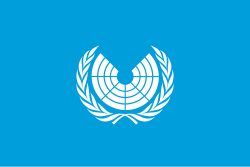UN Parliamentary Assembly
| الجمعية البرلمانية للأمم المتحدة (Arabic) 联合国议会大会 (Chinese) Assemblée parlementaire des Nations Unies (French) Парламентская Ассамблея Организации Объединенных Наций (Russian) Asamblea Parlamentaria de las Naciones Unidas (Spanish) |
|
 |
|

|
|
| Abbreviation | UNPA |
|---|---|
| Type | Proposed Organ of the United Nations |
| Legal status | proposed |
A United Nations Parliamentary Assembly (UNPA) is a proposed addition to the United Nations System that would allow for participation of member nations' legislators and, eventually, direct election of United Nations (UN) parliament members by citizens worldwide. The idea was raised at the founding of the League of Nations in the 1920s and again following the end of World War II in 1945, but remained dormant throughout the Cold War. In the 1990s and 2000s, the rise of global trade and the power of world organizations that govern it led to calls for a parliamentary assembly to scrutinize their activity. The Campaign for the Establishment of a United Nations Parliamentary Assembly was formed in 2007 to coordinate pro-UNPA efforts, which as of July 2013 has received the support of over 800 Members of Parliament from over 100 countries worldwide and is supported by over 5,000 people. The Commission on Global Security, Justice and Governance, chaired by former U.S. Secretary of State Madeleine Albright and former Nigerian Foreign Minister Ibrahim Gambari, has called for the creation of a United Nations Parliamentary Network "to raise greater awareness and participation by strengthening the voices of legislators in global institutions." The Commission proposes that this Network "would be similar in initial composition to the Parliamentary Network on the World Bank and International Monetary Fund and the Parliamentary Conference on the World Trade Organization".
Supporters have set forth possible UNPA implementations, including promulgation of a new treaty; creation of a UNPA as a subsidiary body of the UN General Assembly; and evolution of a UNPA from the Inter-Parliamentary Union or another non-governmental organization. Several proposals for apportionment of votes have been raised to address disparities in UN members' population and economic power. CEUNPA advocates initially giving the UNPA advisory powers and gradually increasing its authority over the UN system. Opponents cite issues such as funding, voter turnout, and undemocratic UN member nations as reasons for abandoning the project altogether.
...
Wikipedia
